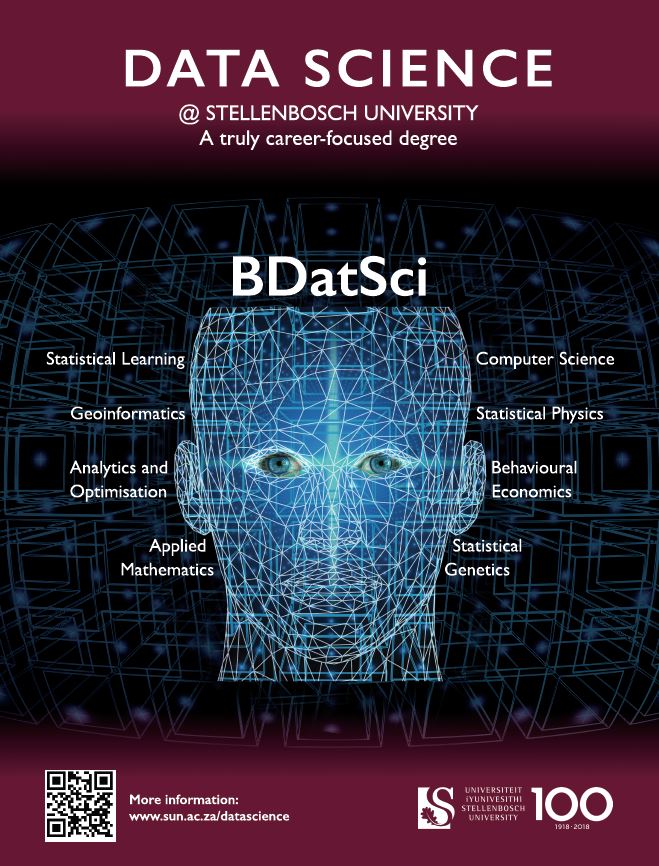Career-focused focal areas
The core component of the BDatSci degree consists of core modules in all four years. During the first and second years, the core modules are Mathematics, Computer Science, Mathematical Statistics and Data Science. In the third year, they are Mathematical Statistics, Computer Science and more Data Science modules. During the fourth year, the Statistical Learning module is compulsory plus a Data Science research project. The research project forms the core of the fourth year, when students will be required to submit a supervised project in one of the focal areas that completes the data cycle as a keystone project in Data Science.
Students will register officially for one of the eight focal areas. Once a focal area is selected, all modules within that focal area is compulsory. No elective modules of other focal areas or other degree programmes may be chosen. The fourth year focal area will determine in which faculty you will obtain the degree.
The BDatSci degree is a full-time programme and residential to the Stellenbosch campus. No remote or online offering possible.
It is now possible to change focal areas after year 1 or year 2, without adding extra years to your study. Click here to see what modules are recognised from some focal areas if changing to a new focal area.
The
focal areas are career-driven and module combinations are compulsory within each of these focal areas:
1. Statistical Learning (Faculty of Economic and Management Sciences): Statistical learning entails identifying trends and patterns in data, and using these to construct mathematical models which can be used to predict or classify outcomes. It is used in diverse fields such as computer vision, speech recognition, sport and finance.
Modules in this focal area are mainly from Mathematical Statistics, offered by the Department of Statistics and Actuarial Science.
2. Computer Science (Faculty of Science): Computer Science studies the
principles and practice of computation and data processing; it considers
problem-solving techniques and data manipulation for everything from routing
data over the Internet and powering your social media feeds, to controlling GPS
satellites, manufacturing robots, or even your computer.
Modules in this focal area are mainly from Computer Science, offered by the Division of Computer Science.
3. Analytics and Optimisation (Faculty of Economic and Management Sciences): Operations
researchers use analytics and optimisation techniques to make a difference in
the world. Mathematics is applied to complex
problems to
find meaningful, data-driven insights and improvements. Operations research is the science of better, evidence-based decision making.
Modules in this focal area are mainly from Operations Research, offered by the Department of Logistics.
4. Applied Mathematics (Faculty of Science): Applied mathematics looks at real world applications of mathematical methods in fields such as science, engineering, business, computer science and industry. It is therefore a combination of maths, science and domain knowledge.
Modules in this focal area are mainly from Applied Mathematics, offered by the Division of Applied Mathematics.
5. Behavioural Economics (Faculty of Economic and Management Sciences): Behavioural economics studies how
psychological and economic factors affect the decisions we make as investors,
consumers, voters and workers. Applying these theories to data provides data
scientists with the opportunity to understand, predict and influence human
behaviour.
Modules in this focal area are mainly from Economics, offered by the Department of Economics.
6. Statistical Genetics (Faculty of AgriSciences): Statistical genetics is the field of study where statistical methods are used to make inferences of genetic data. It is used in fields such as population quantitative genetics by for example plant breeders and conservation geneticists and in genetic epidemiology where the effects of genes on diseases are studied.
Modules in this focal area are mainly from Biology and Statistical Genetics, offered by the Department of Genetics.
7. Geoinformatics (Faculty of Arts and Social Sciences): Geoinformatics is the science and technology dealing with the structure and character of spatial information, its capture, its classification and qualification, its storage, processing, portrayal and dissemination.
Modules in this focal area are mainly from Geoinformatics, offered by the Department of Geography and Environmental Studies.
8. Statistical Physics (Faculty of Science): Statistical physics uses sophisticated maths and simulations to explore and understand the physics underlying everything from quantum mechanics to phase transitions to factory nuts and bolts.
Modules in this focal area are mainly from Statistical Physics, offered by the Department of Physics.

